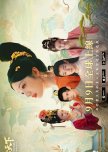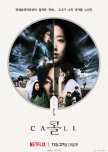
Vast improvement from the first instalment.
I am positively surprised. While technically this movie presented the same issues I had with the previous one (weird mix of genres, slice of life drama and romance, too short of a screentime in the locations themselves), somehow the directing and storytelling is smoother and it made it all work out.I think the poster actually quite well presents the ratio of the horror and the other elements in the movie - it's not that scary, there are not that many ghost scenes, any tensioned built is smoothed and mellowed by the more mundane plotlines, that are in fact also entertaining.
Initially I questioned the need of Karin as a main character, but soon the plot became more clear and her existence not only valid, but necessary for the story to unfold the way it did. While I do think some twists and turns were more obvious than they intended them to be, it was still a rather enjoyable watch.
Performances, directing, editing, sound design - all great. No major complaints. Male lead was way too chill about everything that was happening around and to him for most of the movie, but that’s more of the writing than acting issue. If a ghost had hots for me and started to make moves, I’d be gone not only from that house, but also from the country. Just to be sure.
Overall, I’d say watch this, skip the first one. They are not connected plot wise so they can be viewed as different stories in the same universe.
Was this review helpful to you?

story sends a horrible message!
The acting was really stellar, the set was believable and the NC scenes were portrayed in a way where I was at times wondering if penetration was really happening.What I simply can't look passed is the message this movie sends out.
You cannot cure someone's suicidal ideation by r*ping & traumatizing them for life.
This should not have been categorized as "BL", "BDSM" or gay. It's not a love story, and BDSM is also only BDSM when consent is involved, not when one party gets kidnapped & r*ped for weeks.
This should be a Horror, (psychological) Thriller.
Had it been portrayed as such and had the movie shown the actions of the perpetrator through a critical lense instead of trying to justify them it would've ranked way higher for me.
Was this review helpful to you?

I'm obsessed with this game
I've replayed it so many times and still get something new out of it each time. The acting, the music, the story, the costumes, everything is so beautifully done. There are so many possible endings you can get and characters to explore in addition to just following the 'canon' empress path. The romance element is done really nicely, and I love the way it took inspiration from history, it's like a romance visual novel retelling of Wu Zetian's life.If I HAD to criticise it for something, I would say there are scenes where I wished they had made the actors' makeup look less beautiful to suit the story better but this is issue is common in most C-Dramas. I also took issue with the funeral wear being black instead of the white it would have been in that time period. There was also ONE ending that I got that I felt was implausible and out of character. But truly, that is all and I am nitpicking.
It's cheap to buy and sooooo much fun to play. I promise you, if you love historical C-Dramas you will be as obsessed with this game as I am.
Was this review helpful to you?

The Childe (2024) – Review 8.1/10
The Childe (2024) – Review8.1/10
Fun and highly entertaining. Kim Seon Ho steals the show, his unexpected comedic beats land perfectly and make the character oddly charming despite the chaos. The plot moves at a solid pace, never dragging, with enough twists to keep the tension alive. Action sequences are punchy and well-staged, and the thriller elements stay engaging throughout. Overall, it’s a stylish, fast-moving Korean action thriller that knows exactly what it wants to be and delivers.
Was this review helpful to you?

This review may contain spoilers
My January 2026 recommendation
Watched this for my Recommendation Challenge from 𝑵𝒐𝒊𝒓𝑹𝒐𝒔𝒆𝑯𝒆𝒂𝒓𝒕. Let’s talk movie…The story follows Joko and Zoey, who work as personal assistants for Sasha, a powerful digital media mogul.
Joko is a young man trying to help his family survive, while Zoey is an ambitious woman hoping to prove herself to the world. An opportunity arises when Sasha is looking to hire a new personal assistant.
Joko’s family is drowning in debt, so when Sasha offers a position with a huge salary, Joko immediately applies. However, there is another candidate with the same determination—but with a very different motivation.
Zoey, an ambitious, driven young woman who is seeking validation from her estranged father. She sees Sasha as the pinnacle of success. To work closely with her is not just a job—it’s a stepping stone to building her own name. And beyond career dreams, she hopes it will finally earn the approval of her estranged father.
To stand out from Zoey, Joko makes a desperate, split-second decision: he lies. He tells Sasha he’s gay—thinking it will make him more memorable, different, hirable. And it works. But instead of choosing one, Sasha decides to hire both of them—with one condition: they must compete against each other for her final approval.
At first, their relationship is pure rivalry—clashing personalities, sharp words, constant tension. But as Joko and Zoey go through endless tasks, their initial rivalry slowly turns into a deep connection. They begin to bond, share personal stories, and eventually develop feelings for each other.
However, behind their growing closeness, Joko’s lie continues to loom over them. Everything starts to fall apart when emotions become tangled with deception. Zoey struggles with her feelings for a man she believes is gay, while Joko cannot admit his true feelings for her—or reveal the truth—without risking his job and Sasha’s trust. This is especially dangerous since both Zoey and Sasha despise liars.
So now the question…
? Will Joko’s lie finally catch up to him?
? Or will he find the courage to tell the truth—no matter the cost?
? Will Joko’s family be free from debt…
? What will Zoey do when she learns Joko lied from the very beginning? Can she forgive him? Or will the hurt be too deep?
And the biggest question of all:
? Will they be able to set aside their differences and find true happiness and love in the end, or will pride and fear keep them apart?
That's pretty much the story without giving the spoiler. Now what I like and don't.
What I like:
+ Sasha is the real deal. She’s someone who is the same both in front of the camera and behind the scenes. You won’t find her being nice in public but ugly to her staff.
+ How Joko in the end faces his nightmare & consequence.
I Love You, Hater explores ambition, insecurity, and the cost of pretending to be someone you’re not. It shows that true happiness only comes when we stop hiding and start being honest—with others and ourselves.
Overall this was a fun movie, full of message, but for me personally really added nothing more…
Was this review helpful to you?

Either horribly edited or just plain horrible
Perhaps QiYi's version of this is heavily edited. This is just a complete mess from the get go. I've started typing out this mish-mash several times but then realized there no way to describe the issues without writing spoilers and since I want people to avoid this mess, I don't want my warning to be hidden.JUST DON'T WATCH THIS UNLESS YOU CAN FIND A VERSION LONGER THAN 1:32:08 Maybe a longer version would reveal what is actually happening. Yes, the subs are bad but that alone can't account for the missing chunks in the story.
Was this review helpful to you?

This review may contain spoilers
Watch this for MDL Challenge. Let’s talk movie…The story follows Parin, a wealthy but troubled Thai bachelor who stays at the hotel where Iris works as the receptionist.
Their friendship has an unusual beginning. Parin is often drunk at the hotel, forcing Iris to drag him back to his room on several occasions. Because he’s the son of a powerful businessman, his father asks the hotel to keep a close eye on him. So, Iris is assigned—almost reluctantly—as his personal assistant.
Despite their initial friction, they begin to connect through shared meals. Later, Parin persuades Iris to visit "Little Thailand" with him, promising her great street food and adventure.
As Iris acts as his guide, she takes him away from the typical tourist spots to more local areas. While Iris believes they are simply sightseeing, Parin is actually searching for something. It turns out that Parin did not come to Hong Kong just for a vacation—he is on a desperate mission to find his estranged mother, who disappeared from his life years ago. And Parin has been using the trips with Iris to search for his missing mother.
Their friendship deepens as they wander through the city together, sharing stories about their childhoods, dreams, and family struggles. Parin is drawn to Iris’s positivity and hardworking nature, and their relationship gradually shifts—from friends, to business partners, and eventually to romantic interests.
For a moment, happiness feels complete.
Parin not only grows closer to Iris—he finally finds his mother. And with that reunion, he learns the truth behind her disappearance: the pain, the sacrifices, the reasons she stayed away. It’s not what he imagined, but it brings him peace.
Just when everything seems to fall into place… something cracks beneath the surface.
Because Iris is hiding a secret, something personal, that could shatter everything they’ve built together. One day, without warning, she leaves for the Philippines and cuts off all contact.
So now the questions remain:
? What is Iris hiding…
? Why did she suddenly disappear…
? And what will happen to Parin after she’s gone…
And the biggest question that lingers…
? Will Iris return, or is this goodbye forever…?
That's pretty much the story without giving the spoiler. Now what I like and don't.
What I like:
+ How Parin & Iris form friendship even though they have diff social status
What i don't like:
- The stupid decision Iris made. I understand the reason behind it, just don't like the action she did.
Overall, Under Parallel Skies is a tender and bittersweet romance that explores love, separation, and hope. It shows how connection can bloom in the most unexpected places—and how sometimes, the people who change us the most are the ones we never saw coming.
Was this review helpful to you?

This is CINEMA
This movie is incredible!! I can't say enough good things about this. The acting, the directing, the concept; all of it was outstanding! The two leads did an incredible job. I always love seeing Jeon Jong Seo! The directing in this is on another level. I just love Lee Chung Hyun as a director so much. Highly recommend!Was this review helpful to you?

This review may contain spoilers
I like Riku and Ichiyou, even though they're crazyyy
I'm very late but here goes:1. Sora is an idiot. He was adopted by a wealthy family, with a great education and a bright future laid out for him, and he threw it all away???I understand the sentimental drive to buy the house, but you can't put a broken dish back together bro. The past is past, everyone has to move on. Just find your sibling when you're an adult. You're a teenager, if anyone ever finds out you're selling your body, your future is doomed. Omg.
2. Ichiyou KNEW Riku had feelings for him. His immediate turn to Riku after Sora's rejection proves it. He had always known Riku liked him; he even said that Riku comforted him whenever he cried. Otherwise he wouldn't have asked Riku that question. He just doesn't like Riku back (well obviously, who would like a 'bully'). So whatever the answer Riku gave him, it wouldn't have mattered. He would still X himself.
3. The scene where Riku kissed Ichiyou all over was the star of the show for me.
Was this review helpful to you?

A unique blend of horror, but lacking somewhere
This film offers a unique and fresh perspective on Thai horror films by blending two distinct beliefs into one captivating story. It is a rare gem in the horror genre that manages to seamlessly weave Christianity and animism together, creating an engaging narrative. The contrast between the two belief systems adds depth to the story, creating a rich tapestry of cultural and spiritual elements that set it apart from other horror films. The integration of both beliefs adds a layer of complexity and intrigue to the narrative.The performances in this movie are quite remarkable. James Jirayu and Mean Phiravich deliver compelling performances that bring their characters to life with authenticity. In particular, Mean Phiravich shines with his portrayal of Mae Muang Sopha, showcasing his versatility and talent as an actor. Pearwah's performance is equally good, pushing the boundaries of her acting abilities.
This movie has its fair share of strengths, but it also has some weaknesses. At times, the pacing feels a little off and some plotlines may seem repetitive. The story's resolution can feel somewhat anticlimactic. The scary level of the film is also quite mild, which may disappoint viewers looking for a more intense horror experience. Also, the characters' backstories could have been fleshed out more to give us a better grasp of their motivations and actions.
Director Kui Taweewat deserves praise for his ability to produce horror films with a unique flavor that sets them apart from the rest. His skillful direction and vision shine through in every frame. One of the noteworthy features is its exorcism scenes, which are nicely crafted to evoke a similar feeling of Western horror films, with intense moments of tension and suspense.
Overall, while the film may not be a groundbreaking masterpiece, it is a refreshing take on the horror genre that offers something new and exciting for fans of the supernatural. But if you're looking for something really terrifying with a solid execution, this probably isn't it. Still, it's worth a watch for the unique twist it provides.
Was this review helpful to you?

This review may contain spoilers
is this a love triangle
it was pretty good but it wasn’t really a love triangle if she didn’t get yuzu a chance like a love triangle where one side has no chance. her brother was mad fine tho AND the dog dying plot was not needed. also what wishes im so confused. why did the mom come home and take her son how’d she know. i can admit they’re very cute together tho but why no communication on why he was mad calling her easy was insane. she never found out abt why that guy liked her from childhood toodid yuzu just accept defeatWas this review helpful to you?

This review may contain spoilers
It's beautiful and kind of boring.
Neither of these stories are new. Boy not living up to his potential until he meets a quirky girl who inspires him to reclaim lost joy. Girl wants to go on epic voyage one of her parents died attempting, but has to leave her partner to do it. That these two stories are pancaked together is in service to neither.This isn't bad. It's certainly beautifully animated, works as good speculative sci-fi and the design is great. It's inoffensive, cute, at times. However...I often found myself bored; for a movie which is relatively skimpy on plot, these are pretty one note characters that float through relationship-building scenes. We never fully get what Jay's whole deal is, or why he's so incredibly taken with Nan- Yeong. She's basically neglected Mommy-Issues in a semi-traumatized overachiever. She wants to go to Mars, he...doesn't really have an opinion until she gets the job and doesn't tell him? Then he's mad, but it's repaired for them to do the long distance thing. Their romance falls flat; not that Jay doesn't seem like a nice guy, but they just seemed to have floated into this relationship. In fact, the movie is so unconvinced of their attraction that they had to throw in the 'met before' trope by having Nan-Yeoung be absolutely obsessed with a song Jay posted then deleted years ago- anonymously, of course.
The movie has a feelings and conventions of a Rom-Com, except when it remembers it's supposed to be Sci Fi. Then it interrupts itself with little episodes which are memories, or maybe hallucinations. While I first I thought it had something to do with space/time and a SciFi concept, I think it just ended up being an Edgy Introspection moment, which is in keeping with the handling of the climax, but felt a little like someone telling you they are deep, rather than showing it in any way.
Over all, inoffensive, pretty, but bland.
Was this review helpful to you?

This review may contain spoilers
Once the dialogue is digested, you get yourself a decent film
She Taught Me Serendipity, along with it's translated title I Can't Say Today's Sky Is My Favourite are both quite fitting titles for this movie.We have our male lead, Konishi, who is an odd college fellow who uses his umbrella no matter the weather. He was on leave for 6 months and just returned to campus. He instantly is captivated by Sakurada who has a large hair bun and is always by herself. He has a part time job at the public bath where our second female lead, Sacchan (Saki) also works. Sacchan is in a school band and is very cheery, unlike Konishi.
On the surface I think this movie may not resonate too much with some viewers. It is heavy with lines, has some very weird transition shots, and a plot that is good but falls into that usual communication between characters problem. However, the acting, especially from Kawai Yuumi and Ito Aoi really do carry a lot of the memorable weight of the movie. Personally, I was a bit bored on my first watch and had to carve out time to re-watch it to appreciate the movie a bit more.
The deeper layer for this movie is quite well done by the writer and director, Ohku Akiko. She blends humour and every day thoughts into quirky and fun dialogue. The first half of the movie reminds me a lot of Richard Linklater's Before Sunrise in which a man and woman meet and have a long evening together getting to know one another with tons of relatable dialogue. Sakurada as a character is great. She has grown up with a fairly large issue that caused her to have no friends. She doesn't want to be seen by others and treats her large hair bun as a type of armour against those who may look at her. Konishi is similar in which he thinks he can hide from the gazes of others with his umbrella. Sakurada is more written and developed as she has her quirks like listening to the TV at full volume, and reading about The Three Princes of Serendip, to which accounts for the two main characters meeting and getting along well in a serendipitous fashion. She is the lead of the two and brings some interests to Konishi. The two even go into a local restaurant where the owner himself wishes to "hide" a menu item and digs further into the theme of having these pasts that don't wish to be shared.
After the half way mark we have a fairly large turn. Sacchan has a wonderfully long scene with Konishi that is a stand out scene. The lines she delivers is touching and memorable not only for us, but our main characters as well. From then on we get an act that I understand what it is going for, but is really just communication problems among the characters, and even hallucinations that throw us viewers for a loop. The resolution comes with some drama and is it enough of a pay off? Personally for me, it was good, but some scenes just did not fit the environment and takes away from the emotion. Sakurada has a fairly long take filled with lines that is done very well and I feel needs to be pointed out.
My biggest gripe would have to be Konishi. He is written to be a fairly flat and boring character. While there are things written to develop him only in the end, he doesn't really do anything with the supporting characters and it makes me question how some of them can feel the way they do.
Overall though, the little details of dialogue, the way words are said, the two female leads delivering detailed and relatable lines, and a decent plot are great positives for this movie. The odd transitions of slow motion and zooms, the somewhat boring male lead, communication issues, and odd scenes here and there that don't really fit do take some points away from this movie. But I see these points at the deeper level of watching to which the good outweighs the not-so-good, so I can easily recommend this to those who want to pay attention and even learn a bit about young adult life lessons. Obviously Kawai Yuumi fans as well.
Was this review helpful to you?

the world can be silent, but they will always have love
A hard truth about how deaf people are often exploited by those who only care about their own gain. because their voice never been heard.Ma is portrayed as a gentle, father whose entire world revolves around one thing: protecting his daughter and hoping she’ll have a life better than him.
From the story to the performances, everything feels painfully right.
This movie broke me. I'm crying a lot watching this — because it feels honest, quiet, and deep 🥺
the world can be silent, but they will always have love"
Was this review helpful to you?

very beautifully made
this movie for me is truly beautifully made , I just adore how the creator integrated this kind of metaphor of making love (yk what I mean) into such a beautiful art. I think its something thats not easy to do but they really nailed it and the acting is on point. I also love the diversity of cultures that were included in this movie and just struggles that proffersional dancer go through on a daily basis. AND CAN WE ALSO TALK ABOUT HOW GOOD THE ACTORS ARE IN ENGLISH AND SPANISH??? like I wouldve really thought they were from these countries if I didnt know the plot.Was this review helpful to you?
Recent Discussions
-
 Last Japanese song you listened to? #250 minutes ago
Last Japanese song you listened to? #250 minutes ago -
 Where are all the good xianxias?1 hour ago
Where are all the good xianxias?1 hour ago -
 BL Drama Lovers Club1 hour ago
BL Drama Lovers Club1 hour ago -
 First C-Drama You Ever Watched?2 hours ago
First C-Drama You Ever Watched?2 hours ago -
Service Provider Inquiries - GagaOOLala2 hours ago

 1
1 1
1
